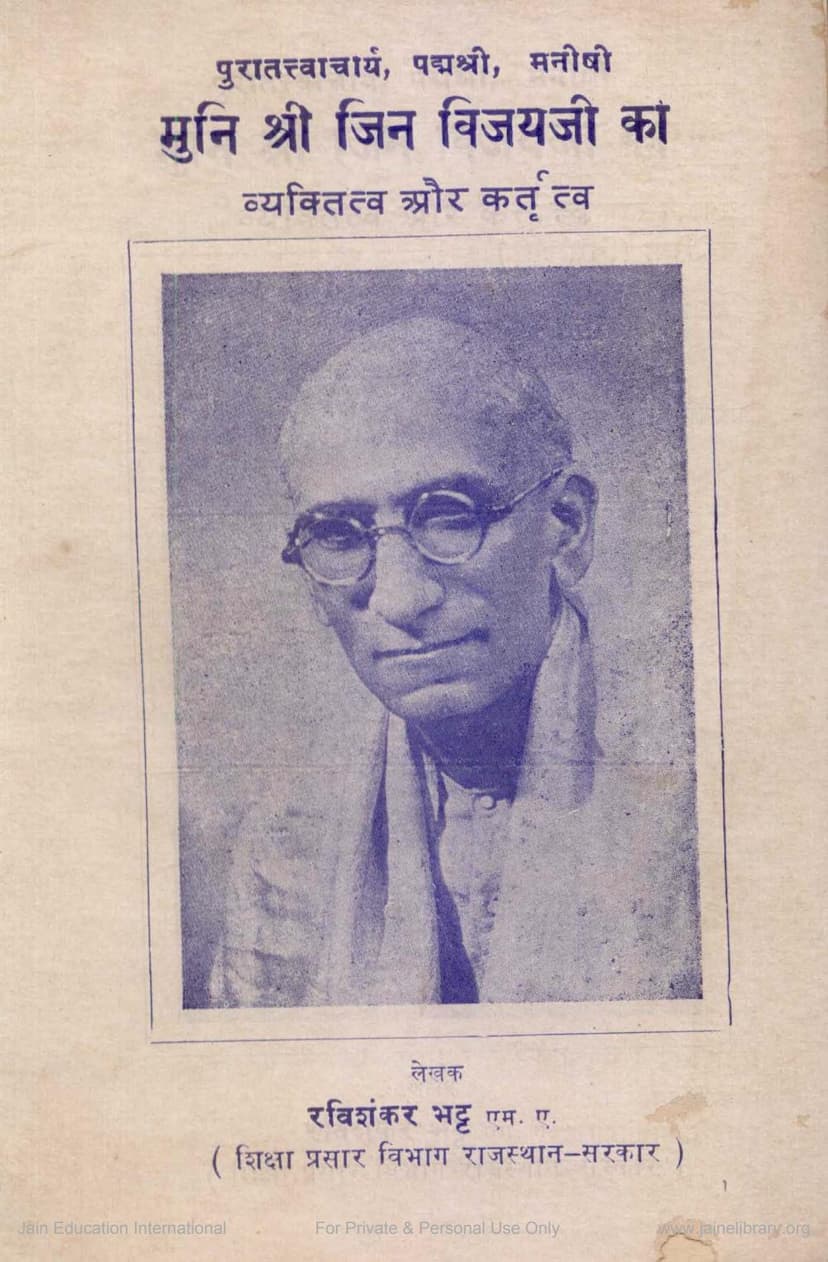Jinvijayji Ka Vyaktitva Aur Kartutva
Added to library: September 2, 2025

Summary
Here is a comprehensive summary of the Jain text "Jinvijayji ka Vyaktitva aur Kartutva" by Ravishankar Bhatt, based on the provided pages:
This book, published by Sarvoday Sadhnashram Chittorgadh, is a tribute to the multifaceted personality and significant contributions of Muni Shri Jin Vijayji, a renowned archaeologist, recipient of the Padma Shri award, and a wise scholar.
Early Life and Intellectual Awakening: Born on January 27, 1888, in the village of Bari Rupheli in the Bhilwara district of Rajasthan, Jin Vijayji's connection with his birthplace was minimal as he left at the tender age of 12-13 with his guru, Muni Devi Hansji. He embarked on a lifelong journey of knowledge acquisition, driven by an insatiable thirst for learning. He did not receive formal education in a traditional school but rather learned by deciphering ancient inscriptions, ruins, and manuscripts. This self-directed pursuit led him to master languages like Pali, Dingal, Prakrit, Sanskrit, Magadhi, and Apabhramsha, and even European languages like German and English after visiting Germany.
A Unique Personality: Jin Vijayji is described as a man of towering stature with a wheatish complexion, clad in white khadi. He possessed a dignified demeanor, emanating ancient Rajput valor, self-confidence, and a keen, piercing gaze from behind his spectacles. Despite his scholarly gravitas, he was also portrayed as shy, simple, direct, and sweet-spoken, often lost in his own thoughts. He is likened to a "burning lamp of the Gandhi era," whose life serves as an ideal for thousands. His personality was deeply imbued with human sensitivity, and those who were close to him could experience his gentle and generous inner spirit.
Contributions to Archaeology and History: Jin Vijayji dedicated his life to unearthing and interpreting historical records. He meticulously studied ancient institutions, archives, inscriptions, and eulogies, providing a new perspective on history. His efforts brought to light numerous forgotten texts and authors, preserving valuable historical and literary heritage. He is credited with collecting and organizing approximately one lakh ancient handwritten manuscripts, a collection unmatched in any other Indian state. He also initiated the publication of ancient texts through the "Rajasthan Prachya Vidya Pratishthan," bringing out 50 books during his tenure.
Involvement in National Movements and Education: His association with Mahatma Gandhi marked a significant turning point. He was invited to the Sabarmati Ashram and played a crucial role in the planning of the National Vidyapeeth (Gujarat Vidyapeeth). He moved to Ahmedabad and served as the Head of Archaeology at Gujarat Vidyapeeth from 1920 to 1928, actively involved in study, teaching, and research.
His commitment to national service extended to active participation in the Salt Satyagraha. He was arrested and imprisoned in Nashik Central Jail, where he engaged in intellectual discourse with other prominent national leaders.
Later, he traveled to Shantiniketan at the invitation of Gurudev Rabindranath Tagore, where he established the Jain Chair and became the Principal of the Jain Literature Department at Visva-Bharati University. He also initiated the publication of the Sindhi Jain Granth Mala, which has published 76 volumes.
He then moved to Mumbai and became the Chief Acharya and esteemed Director of Bharatiya Vidya Bhavan, a prominent educational center. He generously donated his personal library, a collection of immense literary value, to the Bhavan.
Dedication to Sarvodaya and Social Service: Upon returning to his native Mewar, he envisioned establishing "Pratap University," a plan supported by the then Maharana of Udaipur, but it was stalled due to the integration of princely states. He then founded a Sarvodaya Ashram in Chanderiya. Even in his old age, he demonstrated remarkable generosity by dedicating 55 bighas of land to Vinoba Bhave for his Sarvodaya activities and offered the Ashram as a center for the "Shanti Sena" (Peace Army).
Recognition and Legacy: Jin Vijayji's arduous journey and intellectual prowess earned him widespread recognition. The "Rajasthan Sahitya Akademi" honored him with their highest scholarly position, and the "German Oriental Society" declared him a distinguished member, an honor rarely bestowed upon any other Indian. His life is presented as a testament to perseverance, courage, and an unwavering pursuit of knowledge. He is described as a torchbearer for future generations, inspiring them with his dedication to history, archaeology, and Indian culture.
The book also includes a brief introduction to the author, Ravishankar Bhatt, highlighting his academic achievements in Hindi and his inclination towards literary research and creative writing.
In essence, "Jinvijayji ka Vyaktitva aur Kartutva" paints a vivid portrait of a dedicated Jain scholar and national figure whose life was characterized by intellectual pursuit, social service, and an unyielding commitment to preserving and disseminating India's rich cultural and historical heritage.